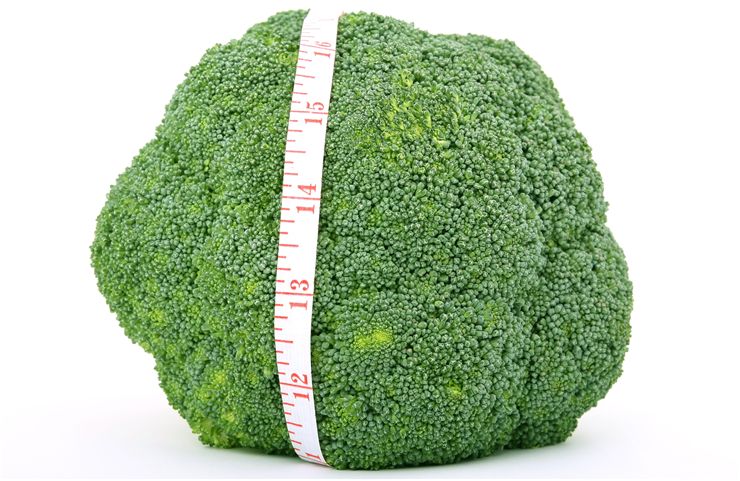Broccoli - Nutrition Facts and Health Benefits
Broccoli is a green plant from the Italica Cultivar group of Brassicaceae family. This family also includes kale, cauliflower, Brussels sprouts, bok choy, cabbage, collard greens, rutabaga, and turnips. Broccoli has the flowering heads, which look like a tree and the name comes from the Italian word for broccoli - "broccolo," which means "the flowering top of a cabbage". There are three popular varieties: Calabrese broccoli (the most popular, it has a larger number of heads with many thin stalks), sprouting broccoli (it has a larger number of heads with many thin stalks) and purple cauliflower (it has a head shaped like cauliflower, but consisting of tiny flower buds).
This vegetable was used in Europe since 6th century BC, but it was brought to England in the 18th century and in America was popularized in early 20th century. It was originated in Italy from wild cabbage. Now is so popular, that is most produced in China and India, although western nations more like to eat it. It can also be found in Africa.

The best way to consume broccolis is to eat them raw because it's the best way to preserves the nutrients, but it can be cooked, fried and steamed like other vegetables.
Broccoli contains significant amounts of vitamin C, vitamin K, dietary fiber, folate, potassium, selenium, vitamin A, manganese, tryptophan, vitamin B6, and phosphorus. It also has unique organic compounds: phytonutrient glucosinolates, flavonoids, and other antioxidants. Besides all that it is low in sodium and calories (about 31 calories per serving) and a fat-free. One cup of broccoli gives us over 100% of the daily need for vitamin C, and vitamin K. Broccoli is a safe food for children because it's a hypoallergenic vegetable (very few people are allergic to it).
Because it removes extra estrogen from the body, broccoli is especially important in fighting and preventing breast cancer, but it also good in prevention of other cancers - cancer of the uterus, prostate cancer, and cancer of internal organs: the lungs, colon, liver, kidneys, and the intestines. Broccoli has anti-carcinogenic compounds: glucoraphanin, diindolylmethane, beta-carotene, selenium, vitamins C, A and E and also zinc, potassium and certain amino acids. Sulforaphane is important because it can inhibit the enzyme histone deacetylase which is involved in the progression of the cancer cell. Isothiocyanate can activate some genes that fight cancer and switch off others that fuel tumors. You may want to eat 1/2 cup per day or two 2-cup servings per week because in some studies it has been shown to be enough to get some cancer prevention benefits.
Broccoli is also very good detoxifier due to the presence of vitamin-C, sulfur, and certain amino acids. They can remove free radicals and toxins and purify the blood, so the broccoli is a fighter against boils, itches, rashes, rheumatism, gout, arthritis, renal calculi, skin diseases like eczema and hardening of the skin. As journal Proceedings of the National Academy of Sciences of the United States of America showed the sprouts of broccoli might be especially important for all this. Also, all of this substances can protect you from numerous infections, so broccoli is also very important for immunity.
Broccoli can help reduce bad cholesterol and keep the heart and kidney function by regulating blood pressure, all that thanks to a very high fiber content, along with significant levels of beta-carotene and omega-3 fatty acids. The potassium from broccoli is a vasodilator which can make better blood flow by relaxing the tension of veins and blood vessels. Chromium helps to the proper function of insulin and in that way regulates blood sugar and blood pressure as well. Copper from broccoli is, along with iron, essential mineral in the production of red blood cells, so broccoli fights anemia, too. Soluble fiber from broccoli can draw cholesterol out of your body and sulforaphane may be able to prevent (or even, some say, reverse) some of the damage to blood vessel linings. But, a study from 2010, showed that there's no evidence to suggest broccoli can help lower blood pressure.
Broccoli is very important for a pregnant woman since it is so nutritious and full of proteins like calcium, vitamins, antioxidants, detoxifiers, iron and phosphorus. It can also eliminate constipation thanks to fiber (half of its fiber is insoluble, and half is soluble, so that can help us to meet needs for both types of fiber). The folate content in broccoli is maybe most important because it ensures that there are no birth defects (like neural tube defects), and it's good for all people who have a folic acid deficiency in their diet. Broccoli is very rich in calcium (47 mg. per 100 grams), so it's good for bone health, too.
Antioxidant from broccoli, zeaxanthin, protects from cataracts, macular degeneration (an incurable condition that blurs central vision) and recovers our eyes from damage caused by UV radiations.
It's important to know that broccoli contains goitrogens, which can interfere with the function of the thyroid gland, so people who have thyroid problems should limit consumption of broccoli.

China is still top producer of broccoli, producing over 8 million tons of the vegetable a year. In The United States grows over 1 million tons per year. Broccoli is so popular that today exists broccolini (a mix between broccoli and Chinese broccoli "gai-lin") and broccoflower (a cross between cauliflower and broccoli).

